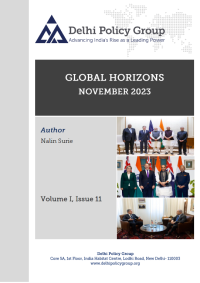Global Horizons
Date: December 06, 2023
The month of November was marked by intense high-level diplomacy focused on the Middle East and the Indo-Pacific, and this issue opens with coverage of the Israel-Hamas war, which resumed after a brief pause. The US was engaged in preventing conflict escalation and the provision of humanitarian assistance, as pressures grew from the Arab states, the BRICS nations and the EU to seek a long-term, two-state solution.
Meanwhile, away from the limelight, the war in Ukraine dragged on. Faced with the reality of continuing military and economic resilience of Russia, the US, EU, NATO and G7 offered reassurances to Ukraine on long-term support.
The summit held between Presidents Biden and Xi near San Francisco on November 15 saw both sides looking to restore basic normalcy to relations. The outcomes suggest that China needed the meeting more than the US, and that President Xi did not find the reassurances on accommodation of China he was looking for.
Meanwhile, the month also saw several important summits among nations of the Indo-Pacific, including US-Indonesia, Japan-China, and Australia-China. The Foreign Ministers of China, Japan and ROK met on November 26 to revive this trilateral after a gap of four years, concluding with an agreement to hold an early trilateral summit. Japan expanded its outreach to the ASEAN nations of Malaysia, the Philippines and Vietnam.
India’s global engagements during the month were no less intense, covering the successful conclusion of its G20 Presidency, 2 2 Ministerial Meetings with strategic partners the US and Australia, the visit of the King of Bhutan to India, and the convening of the India-EU Trade and Technology Council at the Ministerial level.
The author concludes that as the year draws to a close, India can take considerable satisfaction in that its focus on development and the Global South, reformed multilateralism, strengthening of multipolarity, and emphasis on dialogue and diplomacy to resolve disputes, is making an impact on world affairs.
To read this Global Horizons, Vol. I, Issue 11, please see the PDF.
Meanwhile, away from the limelight, the war in Ukraine dragged on. Faced with the reality of continuing military and economic resilience of Russia, the US, EU, NATO and G7 offered reassurances to Ukraine on long-term support.
The summit held between Presidents Biden and Xi near San Francisco on November 15 saw both sides looking to restore basic normalcy to relations. The outcomes suggest that China needed the meeting more than the US, and that President Xi did not find the reassurances on accommodation of China he was looking for.
Meanwhile, the month also saw several important summits among nations of the Indo-Pacific, including US-Indonesia, Japan-China, and Australia-China. The Foreign Ministers of China, Japan and ROK met on November 26 to revive this trilateral after a gap of four years, concluding with an agreement to hold an early trilateral summit. Japan expanded its outreach to the ASEAN nations of Malaysia, the Philippines and Vietnam.
India’s global engagements during the month were no less intense, covering the successful conclusion of its G20 Presidency, 2 2 Ministerial Meetings with strategic partners the US and Australia, the visit of the King of Bhutan to India, and the convening of the India-EU Trade and Technology Council at the Ministerial level.
The author concludes that as the year draws to a close, India can take considerable satisfaction in that its focus on development and the Global South, reformed multilateralism, strengthening of multipolarity, and emphasis on dialogue and diplomacy to resolve disputes, is making an impact on world affairs.
To read this Global Horizons, Vol. I, Issue 11, please see the PDF.



